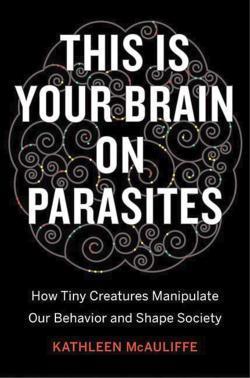Thom reviewed This is your brain on parasites by Kathleen McAuliffe
Review of 'This Is Your Brain on Parasites' on 'Goodreads'
3 stars
The human body contains about 100 trillion cells, but roughly 90% of those are from bacteria, viruses and other microorganisms. This book surveys how parasites, pathogens and viruses affect their hosts and those that move between species - like rats who love cats and zombie ants.
The first third of the book focuses on those species hopping parasites, including those like Toxoplasma gondii which can end up in humans. The text then moves into other pathogens, viruses, and our gut biome. Each problem has a way to avoid it, an immune response - many generated by the body itself. Perhaps the most interesting part is the last, which focuses on the Behavioral Immune System, a concept created by Mark Schaller to describe how individuals within society avoid infection.
That last conscious (and unconscious) method is also the most controversial. Studies are described connecting this avoidance to fear of immigrants, people …
The human body contains about 100 trillion cells, but roughly 90% of those are from bacteria, viruses and other microorganisms. This book surveys how parasites, pathogens and viruses affect their hosts and those that move between species - like rats who love cats and zombie ants.
The first third of the book focuses on those species hopping parasites, including those like Toxoplasma gondii which can end up in humans. The text then moves into other pathogens, viruses, and our gut biome. Each problem has a way to avoid it, an immune response - many generated by the body itself. Perhaps the most interesting part is the last, which focuses on the Behavioral Immune System, a concept created by Mark Schaller to describe how individuals within society avoid infection.
That last conscious (and unconscious) method is also the most controversial. Studies are described connecting this avoidance to fear of immigrants, people who are unclean and even those with dark skin. Other connections made include collectivist vs individualism and even conservative vs liberal. A few studies do not make a truth, and correlation does not imply causation, but these sections do lead one to think.
The book jacket states it was extended from a successful article, and at times it feels like it. Descriptions fall a bit closer to pop science than clinical precision. Speculation is frequent, and the author focuses a little too much on disgust as a motivation. At various times, the author speculates on who exactly is in control, the parasite or "you".
Overall interesting, and a fairly quick read.

